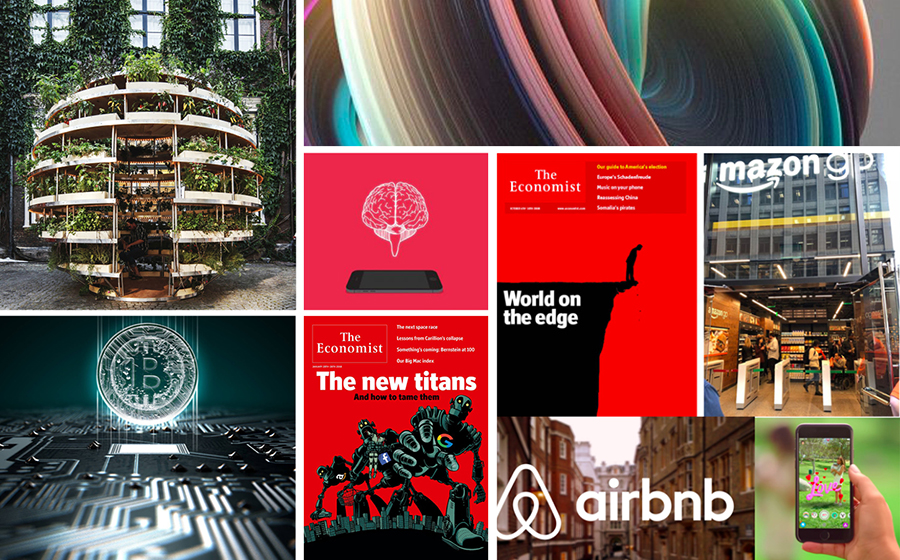In a world of increasing algorithm-driven precision, instability is still ironically, or perhaps understandably, a persistent form of normal. It seems that shocks to the system, outliers and inherent human fear of change are triggering wild swings across the board.
We see this volatility most prominently in the powerful anti-establishment waves that have ushered in radical voices in governments around the world. We also see it in the continued disruption across industries powered by the combination of digital and social media, lower barriers to entry for smart new players and an increasingly informed, sophisticated and determined consumer.
This degree of instability, triggered by the settling of powerful tectonic shifts of technology, demographics, changing cultural mores and engagement models, is the new normal companies must face, navigate and thrive in. The following is a primer on six of these big shifts, along with business and creative implications.
1. Recalibrated Survival
The modern human condition has put individuals on edge. A recent survey of American consumers by The Doneger Group, reveals that over half of the population faces some level of worry or anxiety, with job insecurity ranking at the top. This is especially difficult for younger consumers entering adult life with higher debt levels than any previous generation. There is also an increasing fear of the gig economy becoming the norm and the instability it will create. The global sociocultural and political noise further exacerbates these feelings, and recent high-profile digital security breaches put the sense of self-identify further at risk.
Recalibrated Survival is the state of constant betterment and optimization required to stay current, competitive and attractive. It\’s a way the individual seeks to get further ahead and break out of the cycle of hustle. While this survival mode is urgent, consumers see it as a means to an end of security, stability, inspiration and wellness. Driving the conversation in a survival mode are cultural unifiers such as music, film, community service, sports and other activities that bridge cultural schisms and give us relief through a common experience. Work, or the modern- day more flexible definition of work, is at the core of this conversation; companies and talent are primed to find better ways of creating a happy place and experience in terms of the new work environment.
Recalibrated Survival values protection, guidance and personalization. We see the rise of products and services that enable the individual to get ahead, feel smarter and be more informed. Think of hyper-personalized recommendation platforms, niche subscription services, next generation loyalty programs, quantified-me wellness platforms and the continued rise of alternative medicine and wellness practices. Education and skills-building products such as MasterClass will thrive as individuals will want access to experiences that make them more creative and innovative to thrive in the ideas economy.
2. Return to the Core
Complexity and surface noise are creating unnecessary obstacles and mounting pressures for most of us. We deal with this stress by simplifying things around us and returning to the core: values, relationships and inspiring experiences. This tilt towards simplicity is carrying over to the business side as companies are finding ways to simplify their corporate structures as they also work to make their consumer journey more powerfully simple. We see a hunger for directness and immediacy in the continued rise of human-machine interactions as evidenced by the rise of conversational design and new innovations including voice assistants and smarter bots.
Return to the Core will prize simplicity, design thinking, purpose-driven brands, smaller influencer circles and next-gen loyalty programs. Think of better integration of services and systems around more nimble intelligence and intuition. Home, wellness and experiential industries will find deeper meaning and potential in this shift.
3. FlexState
FlexState is the ability to shape shift, which will be the most prized skill in the near future. As models of engagement evolve, those individuals and organizations with broader transcendental skills, creative vision and networks will thrive. We see flexibility rise across the board, whether it be the gig economy and its pool of freelancers or corporations exploring new adjacent opportunity spaces and delivery channel strategies. In an era of continuous disruption, a spirit of experimental play will be critical for growth.
FlexState will prize personalization, deep learning, multi-dimensional experiences, hybrid materials and interfaces, omnichannel and omni-personal approaches, new forms of business collaborations and new forms of engagement. The arts meet business and tech: MFA meets MBA in re-educating new business skills.
4. Radical Innovation
Competition is heating up and industries are facing a moment of reckoning, most required to streamline and drastically reduce redundant inputs including resources, time, investments and environmental impact. The challenge is that this must shift at a time when the consumer wants more of everything. Companies that turn this challenge into an open innovation exercise will thrive. Early winners seem to be those with a strong purpose, fluid ecosystem and planning culture and an intuitive command of culture and society and the role their brands play in shaping these conversations. The smarter ones will also bring in the consumer directly into the solution, creating the ultimate form of engagement.
Radical Innovation will prize the human experience, talent-based strategic design, sustainability as the ultimate challenge, the circular company, purpose-led design and more direct forms of consumer/customer engagement.
5. Post-Hype
Hype has helped fuel our economy during the past 10 years. Direct-to-consumer changemakers now face the moment of reckoning with their ability to scale up, be profitable and perhaps most challenging, reign in and reshape their founder-led culture. We have high hopes that as these companies mature, they will form a new hybrid between the best of the disruptive values that gave them life with a next-generation corporation ethos that is more human and agile.
Post-hype will prize the new emotionally connected CEO and management with new success metrics, such as work-life balance, the circular/sustainable company, conversational design, transparency and measurement. Tonality and messaging will also be more open, transparent, conversational, empathetic and overall more collaborative.
6. Trust Economy
With trust hitting all-time low levels and our digital footprints lasting forever throughout the ether, consumers will increasingly make trust an important factor in the brand consideration and purchase journey. Companies will up their ante on the security front and dial up the narrative of security to their customers. Next generation security brands like Lifelock will become more commonplace and current brand leaders will get more serious around their security plays, including how they structure relationships around data with their customers.
The Trust Economy will value data privacy and control, emotional commerce, peer-to-peer selling, smaller circles of trust and next level block chain.
Takeaways
As you navigate these shifts, it\’s critical to manage change through the lens of your brand and what you stand for. Timeless brands are able to leverage their values to navigate change fluidly and most importantly, to lead change. Think of ways in which your brand can become a disruptor by listening, getting out of comfort zones and dreaming up new, formidable ways to bring consistent value to your customer. That space is where the power of relationships can result in transformative groundswells.




